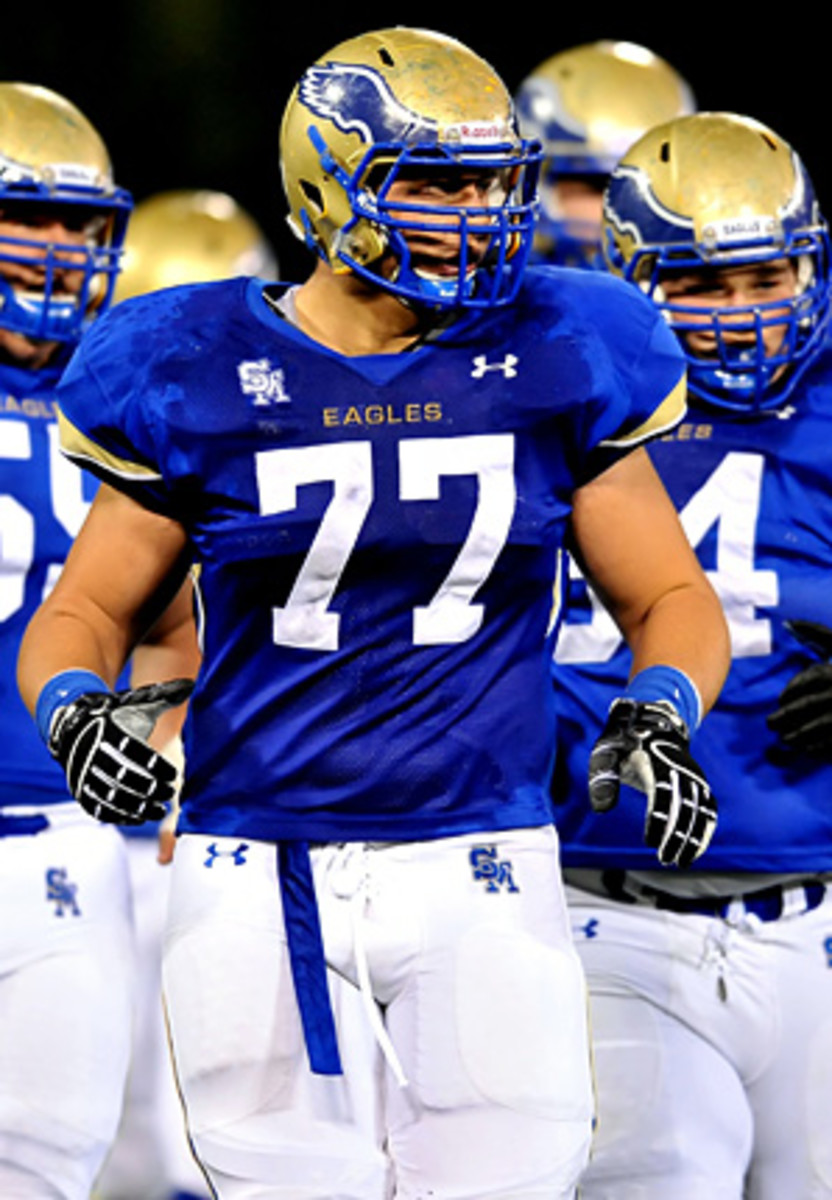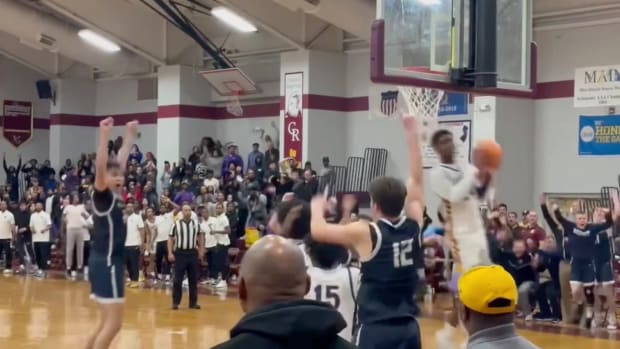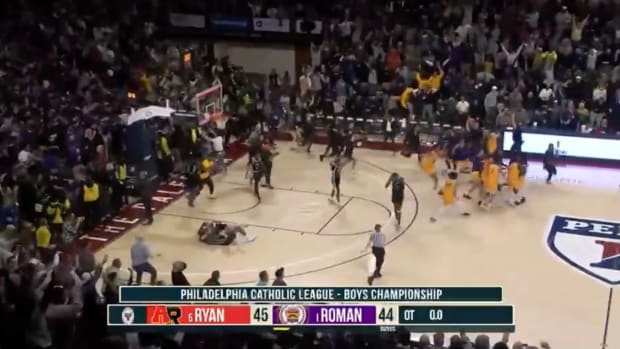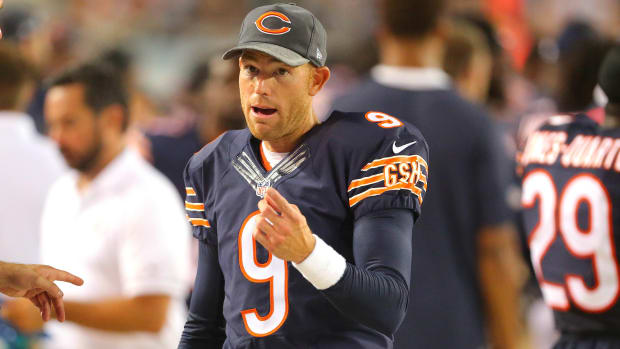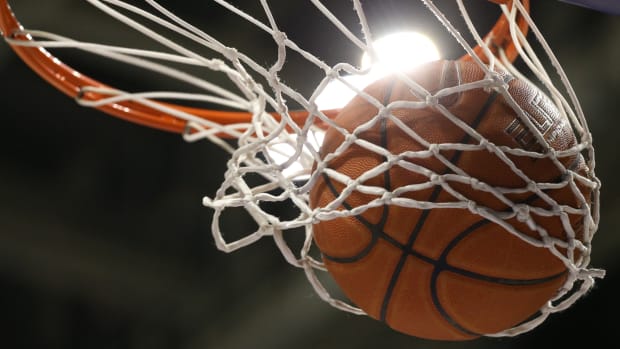Lane Kiffin, USC find recruiting success despite NCAA sanctions
"Eighteen months ago, you couldn't find a positive article about the future of USC's program,'' said Kiffin. "Eighteen months ago, when [the sanctions] happened, everybody talked about it being the death penalty. USC was over.''
Nearly two years later, that notion has all but disappeared.
Banned from bowl participation the previous two seasons, USC has overcome NCAA sanctions to regain its status as one of the nation's premier college programs. It closed 2011 with a 10-2 record -- including a thrilling 38-35 win at Oregon -- to finish sixth in the AP Poll, and will return star quarterback Matt Barkley heading into 2012. It seemingly secures a preseason top five ranking.
This winter was supposed to mark the first year that recruiting sanctions hurt the school: The Trojans are limited to 15 scholarships -- 10 fewer than the normal NCAA limit -- for the next three recruiting cycles. But one week before National Signing Day, USC boasts one of the strongest classes in the country and remains very much in the mix for many top uncommitted recruits.
To wit: Kiffin and Co. have commitments from four Rivals100 prospects, including five-star offensive lineman Jordan Simmons, and remain in contention for nearly a dozen others, including five-star offensive lineman Zach Banner. Just last weekend, four-star quarterback Cyler Miles, the No. 2 dual-threat prospect who committed to Washington in June, said he is considering changing his pledge to USC.
"It's business as usual at USC except they are having this success despite having to be much more careful with their offers and who they can take commitments from," said Mike Farrell, a national recruiting analyst for Rivals.com. "A great season on the field certainly helped, but Lane Kiffin and his staff are keeping the brand name of USC strong."
But for USC to prosper -- not simply survive -- Kiffin will need to be shrewd in managing his scholarships. He'll also need to withstand a barrage of negative press from opposing recruiters.
Jabari Ruffin, a four-star linebacker from Downey (Calif.) who committed to USC last March, said other schools didn't discuss the USC sanctions with him.
"That was never brought up, especially with the season [USC] just had," said Ruffin. "I was surprised, though. In a job like that, when you're recruiting somebody to a school, you might say anything. But nobody went there.''
Although Ruffin didn't experience a rival school badmouthing USC, Kiffin indicated that other recruits listened to plenty of misleading statements.
"A lot of stuff gets thrown out there to these kids from other places that's inaccurate on what exactly is happening over the next few years, how many guys we can sign and what our numbers really are,'' Kiffin said. "We actually have to do a lot of correcting inaccurate information. We get all kinds of things. That if you get injured, with the reduced numbers, they're going to cut you. That they're only going to be able to sign six guys [in a given year]. We deal with a whole bunch of stuff.''
Those concerns haven't stopped USC from landing plenty of quality talent. As the chart to the right demonstrates, 10 of USC's 12 commitments for 2012 (including early enrollees) are four- or five-star prospects. Even amid a period of probation, the USC name means plenty to blue-chip prospects.
"It's freaking USC," Diablo Valley (Calif.) defensive end Morgan Breslin told USCfootball.com last month after switching his commitment from UCLA. "I was just in shock that they were recruiting me. ... To be honest, I don't even know how to explain how excited I was to have a chance to go there.''
But there's a catch. The scholarship reductions prevent USC from signing every touted recruit that wants to play in Los Angeles. Kiffin and staff must decide which prospects best fit the program.
"I think their goal for the next three years is to get 15 -- and to get 15 quality kids," Farrell said. "That's why you're seeing a lot less offers out there. They used to blanket the country with offers. Now they're not doing that. They're being very picky. Getting to 15 is easy. It's about getting to 15 with the right guys.''
It's the same challenge that other probation-ridden programs have faced while dealing with scholarship losses.
"You have no room for error," said Florida International athletic director Pete Garcia, who served as the recruiting coordinator on former Miami coach Butch Davis' staff when the Hurricanes were on probation in the 1990s. "Evaluation is the key. It's more about evaluating than recruiting. When you have limits on scholarships, you have to make every one count.''
The other issue is depth. Even if a program makes all of the right decisions, it can be plagued by a lack of reserve talent, especially following an injury. Then again, given Kiffin's NFL background, USC may be uniquely equipped to deal with scholarship reductions.
When the NCAA handed down its sanctions in the summer of 2010, it permitted USC juniors and seniors to leave for another D-I program without sitting out a year, essentially turning them into free agents. Kiffin and staff opened camp with only 70 scholarship players, so, come fall, he wont' be facing a situation that he hasn't previously encountered.
"It's just made us manage our team a little more like an NFL team, with the lower numbers on game day, the lower numbers in practice and the lower numbers in the spring," said Kiffin, who coached the Oakland Raiders from 2007-08. "We had to be a little more specific. Instead of signing big classes -- or getting good players regardless of position -- we had to be more specific about where those guys would exactly fit in as we moved forward. It's more like the NFL.''
If last year's success is any indication, the program is handling its limitations beautifully.
"To finish sixth in the country, have 10 regular-season wins and to [potentially] be a preseason top-five team, it makes us feel very good about what has happened and where our program is now compared to where everybody said it would be," Kiffin said.
But the biggest challenge is yet to come. As the scholarship losses take effect -- and the team loses Barkley to graduation after next season -- USC's ability to remain a national power will depend on its ability to compensate for scholarships by landing the best California, and national, talent.
To avoid a second round of USC obituaries, Kiffin must win with quality, not quantity.
